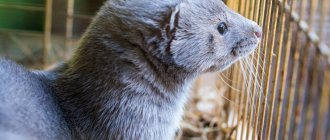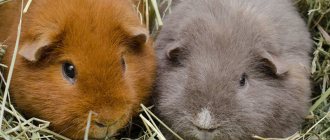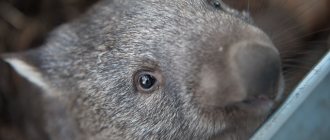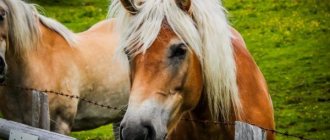Lifespan
Interestingly, how long domestic ferrets live is influenced - just like in humans - by their genetic predisposition.
If the animal’s grandparents were long-lived, then this trait may also be present in the descendant.
Ferrets began to be domesticated relatively recently - about two or three centuries ago. And, naturally, only then did they begin to be interested not only in their biological indicators, but also in their character, habits, and life expectancy.
Domestic and wild ferrets differ in much the same way as a tiger and a domestic cat. They even have different chromosome sets, which in the domestic species have undergone such changes over time that it has acquired the ability to feel quite comfortable in captivity, but is no longer able to survive in nature.
Wild relatives do not have longevity: three or four years is their limit. It is difficult for a small predator to survive in its natural environment. He is being pursued by:
- illness;
- small parasites;
- large natural enemies;
- underfeeding is often observed.
But the domesticated species is protected from all this by the efforts of its owners and, with proper care, can enjoy a life expectancy of 8–10 years. By the way, cases of amazing longevity of ferrets have also been noted - literally a record 18 years.
Diseases that can shorten the life of pets
Unlike their wild counterparts, domestic ferrets are more prone to diseases. Almost all of them arise due to improper care of the pet. Each of the following diseases can lead to death.
The main ailments affecting the body of ferrets:
- Leptospirosis or infectious jaundice. The cause of death is kidney damage or heart failure.
- Aleutian disease. Not fully studied. The disease affects the ferret's immune system. Usually, owners find out that their pet was sick only after an autopsy.
- Plague . Infection. It is fatal in 97% of cases. The animal dies from the plague within 12–35 days.
- Rabies. Disease caused by viruses. The main impact falls on the ferret's nervous system.
- Hepatitis. The disease rarely affects representatives of this species, but if the animal becomes ill, the probability of death is high. The disease disrupts the functioning of the gastrointestinal tract, liver and central nervous system.
- Parvovirus enteritis. This is inflammation of the gastrointestinal tract. If a ferret lives with the disease for 5 days, then the probability of survival increases several times.
How to create a menu
Many have found out in practice that the lifespan of cute little animals is largely determined by their diet. Therefore, it should be made balanced. In this regard, it is necessary to be guided by the fact that ferrets are predators.
The diet of animals should be dominated by beef, horse meat, and boneless fish.
feed offal (lung or stomach). If you decide to include porridge, then they must be cooked exclusively in meat broths. The owner of a ferret should not allow meat to be absent from the menu for a long time. Otherwise, you will have to face problems associated with disruptions in the gastrointestinal tract, a decrease in the immune system and hair loss.
The owner of a cute pet should not feed it citrus fruits or sweets. Ferrets should not be given milk because their bodies cannot digest lactose. Salty, fried or fatty foods can upset the animal's digestion.
In addition to the main menu, the animal should be supported with vitamin complexes. They can be purchased at special pet stores. When purchasing, the composition and dosage must be agreed with a veterinary specialist. In clinics, furry cats can be prescribed courses of injections that will significantly increase the body's defenses.
Before bedtime
Bedtime routines can be simple or complex, depending on a person's schedule and preferences.
It's best to go to bed at the same time every night and get up at the same time every day. Other steps in your bedtime routine may include:
- reading or listening to classical music 30-60 minutes before bed
- drink a cup of chamomile tea an hour before bed
- Avoid TV, phone and computer screens before bed
A study found that bathing 1-2 hours before bed helped people fall asleep on average 10 minutes faster than usual. Taking a warm bath or shower signals the brain that it is time to sleep.
Incentive management
This technique involves strengthening the connection between a person's bed and sleep to improve sleep quality. People following this technique should
- only go to bed when they are tired and get up if they do not fall asleep within a set time (usually 15-20 minutes)
- use the bed only for sleeping and not for eating, reading or other activities
- get up at the same time every day
Sleep restriction therapy
People usually combine this approach with stimulus control therapy. Sleep restriction therapy involves adapting time spent in bed to meet sleep needs. For example, those who lie in bed for 9 hours but sleep for only 7 should not spend more than 7 hours in bed.
People should keep a sleep diary to determine the average amount of sleep they get. Add 30 minutes to your average sleep time to account for the time it takes to fall asleep.
Supplements
Some supplements may help you sleep. You should talk to your doctor before taking supplements, especially if you are taking other medications or have health problems.
Is it possible and how to extend the life of a ferret?
How long ferrets live largely depends on the conditions created for them. What should you consider first?
- Provide nutritious, balanced nutrition;
- clean water;
- sufficient amount of vitamins;
- allocate personal housing;
- provide physical activity;
- provide freedom of movement;
- observe the necessary hygiene standards;
- create psychological comfort;
- Get vaccinated in a timely manner.
Ferrets, although they have sharp fangs, are not rodents at all. They are pronounced predators, and therefore the main food for them is raw meat and offal, fish (naturally, without bones).
The body of these little animals is not adapted to the production of some necessary enzymes and amino acids and does not “know how” to digest vegetables and fruits, so this is not a delicacy for them. They will be more pleased with a present in the form of an egg yolk or a mouse.
It is very important that the animal has free access to clean water, and in large quantities. Ferrets are water drinkers, and if they cannot drink even for a short time, this leads to dehydration and death.
Regarding vitamin complexes, their composition and dosage, it is best to consult a veterinarian.
The ferret needs personal space, so the animal must be provided with it. The best housing is a fairly spacious, appropriately equipped cage: with
- feeder;
- drinking bowl;
- tray;
- “simulators” - shelves, ladders, a climbing pipe, a hammock.
They are the ones who help ferrets keep themselves in good “physical shape”.
These animals are very mobile. And although they sleep for a long time, when they are awake, it often seems that they are in several places at once. Therefore, freedom of movement for them is one of the indispensable conditions for a comfortable life. No matter how spacious the cage is, it is captivity, “imprisonment.”
Ferrets are also very clean. Their cage must be cleaned daily, the drinking bowl and feeder must be thoroughly washed, and the bedding must be changed. The ferret's home should be dry and warm.
Psychological comfort is needed not only by the “human component” of the apartment’s inhabitants. This is equally necessary for pets. Like all living creatures, ferrets are responsive to care and affection. You shouldn’t shout at them, even if the animal has done something wrong—it’s stressful for the animal. For the same reason, you should not leave a ferret alone with any of the other, unrelated pets.
Mandatory annual vaccinations are two main ones - against distemper and rabies. Moreover, if distemper threatens only the death of the animal itself, then a person can also get rabies. There are several more common diseases of predators for which vaccination is carried out, such as infectious hepatitis and parvovirus enteritis. The veterinarian will promptly notify the owners about this.
Vaccination
There are two main vaccinations that must be carried out without fail: against rabies and against canine distemper (distemper). There are no other measures to combat these diseases.
In addition to the health of the pet, the owner should take care of himself and his loved ones, since rabies is incurable and in humans in 100% of cases it is fatal if a person is not vaccinated in time against the rabies virus, which is transmitted through a bite with the saliva of an infected animal. Carnivore plague is not terrible for humans, but it directly threatens the life of a pet.
Vaccination against these diseases is carried out annually. In addition to these diseases, ferrets are vaccinated against the most common infectious diseases of predators, such as: parvovirus enteritis, infectious hepatitis, leptospirosis, adenovirosis. As a rule, polyvalent vaccines are used, for the selection of which it is best to consult a veterinarian.
It should be remembered that only a clinically healthy animal can be vaccinated, and deworming must be carried out 10-14 days before immunization.
Treatment of bronchitis
Treatment for bronchitis depends on whether the condition is chronic or acute. Acute bronchitis usually does not require treatment and goes away on its own. Because viruses cause most cases of acute bronchitis, doctors do not prescribe antibiotics to treat it.
Remedies that may relieve symptoms:
- Drink plenty of fluids: Water helps thin mucus, which makes coughing easier.
- Cough medicines: to relieve cough and discomfort.
- Humidifier: Using this can make breathing easier.
- Lozenges: Frequent coughing from bronchitis can cause a sore throat. Sucking on lozenges may reduce pain.
- Nonsteroidal anti-inflammatory drugs (NSAIDs): Bronchitis can cause chest pain and fever. NSAIDs reduce fever and discomfort.
- Inhalation breathing treatments: Using albuterol relaxes the muscles around the airways and opens them up. This may reduce wheezing and make breathing easier.
Treatment of chronic bronchitis includes the same treatment methods as for acute bronchitis. The following may also help:
- Quitting smoking
: Smoking irritates the respiratory tract. Quitting smoking can reduce the severity of symptoms and prevent progression of the disease. - Inhaled steroids
: Over time, chronic bronchitis can lead to changes in the lungs, including inflammation. Inhaled steroids reduce inflammation, which may improve breathing. - Oxygen therapy
: Some people with chronic bronchitis may have low oxygen levels due to damage to the lungs. Oxygen therapy can reduce shortness of breath and exercise intolerance.
Lifestyle and habits
The ferret belongs to the mustelidae family. He has a long flexible body, covered with beautiful and dense fur, short legs, and a fluffy tail. There is a contrasting pattern on the muzzle. Domesticated horis living in human housing have an individual character. However, all animals, without exception, are playful, friendly, funny and curious. The animals quickly get used to their owners and willingly play with the inhabitants of the house.
Important! The ferret's character deteriorates during the breeding season: the animal becomes irritable, sometimes even aggressive. Veterinarians strongly recommend spaying and sterilizing the animal.
Ferrets are predators by nature, so they are nocturnal, even living at home. The animals like to hide in secluded corners, hide in shoes and stir up the soil in flower pots. If small toys and food are found in a secluded place in the apartment, this is the pet’s doing.
Information! The ferret gets along well with cats and dogs, but living together with rodents and birds is contraindicated.
Pets usually easily learn to go to the litter box and respond to their name. A healthy animal is hyperactive, does not sit in one place, and the idea arises that there are several ferrets in the apartment. For an animal to live comfortably, proper upbringing and training is necessary.
Liberty
Typically, ferrets live in a cage that is arranged according to their preferences, but you can also give your pet the opportunity to move freely around the apartment. To do this, you need to remove all small objects, and also make sure that vital wires are inaccessible to the rodent
It is also important to remove objects from the animal’s habitat that could injure him: knives, ski poles, guitar strings, poorly placed heavy folders, objects that break into fragments - the ferret is a very active animal, anything that can be chewed and dropped will certainly be chewed and dropped, especially if the ferret ended up in your house as a puppy
Ferret cost
The price depends on the place of purchase. If this is a market, the price will be much lower than in animal clubs. It’s just that in such clubs the animals are taken care of better. There they are given all the habits, fed properly and well looked after.
Before you buy such a nimble pet, make sure that there are no cracks or holes in your house, because a ferret can crawl into any hole.
Give him a lot of attention, talk to him and caress him. Especially at first, because everything will be unfamiliar to him and he will be afraid.
A ferret will not live in a cage. The cage can only be a temporary home , for example, while you are cleaning or moving him somewhere. For an animal to feel good, it needs a lot of space, and you will have to allocate at least a room for it. He can also live on the balcony, but it must be insulated. A fluffy's bed should be cozy and soft. Consider this before purchasing.
We can conclude that it is not easy to keep such a pet. You will have to devote a lot of time and effort to him, take care and look after him. But neither cats, nor loyal dogs, nor singing birds can replace the fun that this small, wonderful animal will give you.
But before you buy a cute and carefree ferret, think carefully about whether you need it. Can you give him everything he needs for a normal life at home? If not, abandon this idea so that the animal does not suffer.
OUTDOOR GAMES
Walking a ferret on the street or keeping it only in an apartment is a personal matter for each breeder. But walks in the fresh air can significantly strengthen your pet’s immunity.
You can take a ferret outside only if it is vaccinated against most dangerous diseases, and if the walk is in a place safe from wild animals.
Due to the fact that ferrets are inquisitive and impressionable animals, playing with fallen leaves, in the sand or in snowdrifts will bring your pet a lot of pleasant experiences.
Video: useful information about your pet
Ferrets are delighted with digging holes and tunnels in the snow, but the animal must be accustomed to the cold gradually, in doses, starting with 10-15 minutes of being outside and excluding sudden temperature changes.
If you provide your ferret with tasty, varied and healthy food, quality living conditions and give him at least a little attention, then your pet will be strong and healthy, and will be able to remain your devoted and faithful friend for many years.
Averages
On average, ferrets live with humans for about 8-9 years, with a maximum of 15. For comparison: a wild one barely crosses the 5-year mark. This is due to the natural conditions in which he lives, enemies - larger predators, lack of food, parasites. Wild ferrets cannot last as many years as domestic ferrets live.
The owner must surround the ferret with care
No living creature is immune from sudden death. It is up to the owner to provide everything necessary so that his pet stays with him as long as possible. How many years ferrets live in captivity largely depends on the conditions created for them.
Proper care
We are responsible for those we have tamed. An animal is not a toy, it requires, like a child, that effort be put into its maintenance and upbringing, and therefore its care must be appropriate. You can't feed your ferret whatever you have to. The basis of the diet should be raw rabbit, turkey, offal, chicken, trout, buckwheat, low-fat cottage cheese, quail eggs, vegetables, and special vitamin complexes.
Proper ferret diet
The lack of necessary minerals in a ferret’s diet leads to the development of gastrointestinal diseases, vitamin deficiency, decreased immunity, and hair loss. The water in the drinking bowl should always be clean. It is necessary to ensure that the rodent does not get any prohibited product, because even a small piece of harmful food can cause food poisoning in the animal. It was noted that ferrets fed dry food were more likely to develop cancer. It is important to feed your pet natural food.
You cannot feed an animal in a closed cage for days: this negatively affects its physical and moral health. You need to regularly arrange walks and games in the fresh air. We must not forget about training and muscle loads. The ferret is a friendly animal, inquisitive and easy to contact, so it needs attention and dedication from humans.
It is necessary to observe the rules of animal hygiene, regularly carry out wet cleaning in the room where the rodent lives, ventilate, and change bedding.
Historical reference
The first mention of the ferret is found in the works of the Greek satirist Aristophanes. He lived from 448 to 385. BC e. and in his plays he described a certain marten-like animal that was a pet. Another Greek historian, Strabo, described the fret's hunt for rabbits that flooded the Balearic Islands. There is also evidence according to which Genghis Khan himself in the 13th century, while in Afghanistan, used ferrets for hunting.
In Russia, the history of keeping ferrets begins in 1971, when a pair of furos was given to Soviet zoologists Dmitry and Yulia Ternovsky from the Prague Zoo. The ferret began to spread as pets only in the mid-90s. In 2002, the first clubs for domestic ferret lovers were organized.
Relationships with other pets
If you have other pets in the house, it is better not to show them to each other right away. A decorative ferret must first become familiar with its habitat and get used to the conditions. The best way to communicate is with the same animal. They will quickly become friends and spend a lot of time together.
With dogs
The interaction between ferrets and dogs depends on the breed of the latter. Large breeds of dogs are more popular with small animals; they are associated with tender feelings and strong friendship.
Small breeds of dogs cause irritation in them due to the similarity in character. Ferrets hurt small dogs. Hunting breeds, on the contrary, can offend a small neighbor if they see him as prey.
The most successful condition for the emergence of friendly relations between a dog and a ferret is if you brought a small animal to an adult dog; or both childhood pets.
With cats
Ferrets and cats can develop a wonderful relationship, or they may not pay attention to each other. But there will be no enmity between them if the owner loves them equally.
Cats are used to being loved, so they should not see the owner's warmer attitude towards the ferret.
With birds, rodents, reptiles
You should always remember that a ferret is a predator. Birds, rodents, fish, lizards are prey for him. Therefore, they should be kept in a remote place.
Decoding feed contents
From time to time, ferret owners find it difficult to understand the description of food on the packaging. But experts suggest understanding the contents together:
Find animal proteins (protein). At the top of the ingredient list should be chicken or another form of animal protein. The list of high-quality feeds should include two or more types of meat.
Be careful - there may be grain. See the list of components to see where the grain is located.
Grain foods are very difficult to digest and provide no nutritional value for ferrets.
Check the percentages. Although not required by law, some commercial companies advertise protein and fat percentages on packaging. Choose dry food brands that offer 32 to 40% protein and 18 to 22% fat. When it comes to canned food, choose brands that contain approximately the same amount of protein and fat as dry food.
Choose food with the lowest fiber and ash content. High amounts of fiber (more than 3%) can cause stomach upset and loose, foul-smelling stools. An ash content below 7% will reduce your ferret's risk of kidney stones.
Choose foods that contain taurine to help keep your ferret's eyes clear and healthy and his heart functioning well. This amino acid is found only in animal tissues.
Thus, the food should contain a lot of animal proteins, but should not contain a lot of plant proteins, because... ferrets are unable to digest them, and it turns out that vegetables and grains are completely useless for them. Also, too much plant fiber in the diet can lead to various diseases.
You should know that when choosing food you need to focus on the first listed ingredients - they must consist of meat. Avoid foods with cornmeal or other plant products as the first ingredient on the list.
Remember, ferrets should not starve, if they eat natural foods, then they should eat at least twice a day, and if they eat professional food, then they should stand constantly.
To what age do they grow?
Puberty in males occurs at 7–10 months, in females at 5–9 months. By this age they reach the final stage of biological growth.
Veterinarians recommend sterilizing animals kept in the house. A timely operation will help prevent hormonal imbalance. During the rutting period, an uncastrated ferret's hormonal levels change and their character deteriorates. Due to the inability to satisfy its instincts, the animal becomes aggressive, suffers from baldness and diseases of the internal organs. All this significantly shortens the pet's lifespan.
It is not recommended to castrate/sterilize ferrets under six months of age. Premature castration will slow down psychological and physical growth. The optimal age is 6–8 months.
Liberty
Typically, ferrets live in a cage that is arranged according to their preferences, but you can also give your pet the opportunity to move freely around the apartment. To do this, you need to remove all small objects, and also make sure that vital wires are inaccessible to the rodent
It is also important to remove objects from the animal’s habitat that could injure him: knives, ski poles, guitar strings, poorly placed heavy folders, objects that break into fragments - the ferret is a very active animal, anything that can be chewed and dropped will certainly be chewed and dropped, especially if the ferret ended up in your house as a puppy
Your own place in the apartment
Just like a human, a ferret needs to have a safe haven, a place where it can hide if it wants to be alone. This is especially important for ferrets kept in free conditions, i.e. walking freely around the apartment. Such a place could be a cat house with a blanket or any other type of shelter where there is somewhere to burrow - after all, the ferret is a burrowing animal and is at peace in its burrow.
If the ferret lives in a cage, then it is very important to properly and competently arrange his “apartment”. The cage must be large - at least two square meters with a ceiling height of at least a meter. The walls of the cage should be made of metal mesh; under no circumstances should you put a ferret in a cage with ordinary bars - the animal chews on them and breaks its teeth. The space should be divided into 2-3 floors so that there is enough space for games and climbing.
Habitat
Despite the variety, they are all found throughout the Eurasian continent, North America, and also in northwest Africa. The steppe ferret prefers to live in open areas, and it is almost impossible to find it in crowded places, in forests, in the mountains, etc., but this animal is found in the steppes or semi-deserts of Mongolia, Kazakhstan, China, as well as in some regions of Asia and Europe.
Interesting fact! The fourth variety, bred artificially, cannot be found in the natural environment, since the animal has a fairly peaceful character. In addition, the ferret lacks hunting skills, which does not allow the animal to survive in the wild.
Black ferrets prefer to settle in forests, ravines, near bodies of water, as well as in populated areas, close to people. At the same time, they do not try to go far into the thicket, sticking to open forests, as well as the edges of the forest. The main habitat of the black ferret extends to Europe and part of Africa. The black-footed variety of ferrets prefers forested areas, as well as the prairies of North America, for their livelihoods. At the same time, the black-footed ferret can easily be found in the mountains, at an altitude of more than a thousand meters above sea level.











